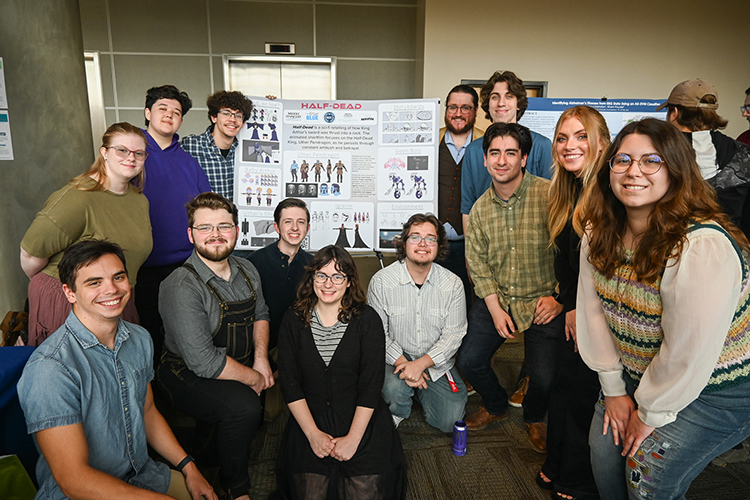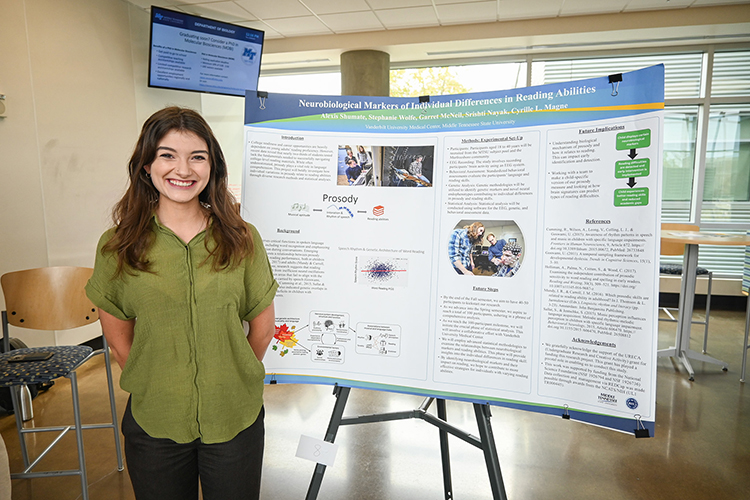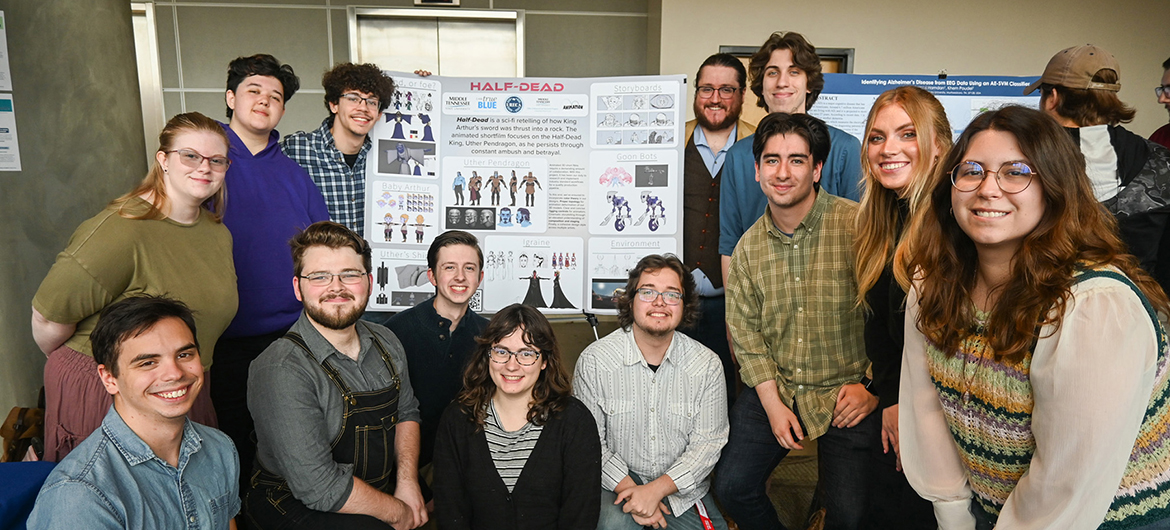The recent sixth annual Open House undergraduate research event, organized by Middle Tennessee State University’s Undergraduate Research Center, burst with curiosity from attendees and passion from student researchers and their wide variety of presentations.

“This has helped me understand that I do want to have a more research-based career … and I’ve really appreciated the help with clarifying that,” said Alexis Shumate, a senior psychology major and presenter, about her experience with MTSU’s research opportunities. “It’s also giving me the confidence and self-efficacy to know that I can do this, that I have the ability to, and that is something I’m very grateful for.”
This year’s event boasted 47 student presenters, 35 projects, 36 faculty and staff attendees and 116 student attendees — almost double the student attendees from last year, said Jamie Burriss, director of the URC and program manager for the Office of Research and Sponsored Programs.
Burriss organized the Nov. 9 event held at the Science Building on campus along with ORSP staff and students in SOAR, the Student Organization for the Advancement of Research.
Scott Handy, chemistry professor and faculty mentor who attended the event, said MTSU does a better job than most at facilitating undergraduate research.
“Starting off, it was maybe 10% of the students I would talk to about it had ever really even thought about research,” Handy said about his more than two-decades at MTSU. “Now it’s probably closer to one third or maybe even half of the students that I’ve talked to, they have at least heard about it.”
Handy also noted an increase of the university’s internal Undergraduate Research Experience and Creative Activity grants.
“When that first started, it was kind of guaranteed that you’d be funded,” he said. “They’re actually seriously competitive now. That’s a good sign … but it’s also, to me, a sign that we need to put more in terms of just financial support into that area.”
Handy said he and most faculty mentors take on mentees to pay it forward, Handy crediting his own undergraduate research experience at the University of Iowa to solidifying his career in chemistry.

Sophomore Chioma Ezeoke attended looking for this same kind of inspiration along with friends Ruth Nwozo, a senior psychology major, and Christabeo Obi-Nwosu, a freshman interested in computer science.
“I’ve been trying to figure out my major, so I thought maybe, you know, coming out here could help me decide,” Ezeoke said.
Nwozo attended to support her friends in SOAR and got involved with research herself as a junior after speaking with James Loveless, her assistant psychology professor.
“There were no open spots for me to, like, do my own (project),” Nwoze said. “But he said I can help assist someone in research, so I was like, any chance I get … yeah, any opportunity.”

Obi-Nwosu wanted to learn more about how to get involved in research and said she was impressed by a project discussing a treatment for Huntington’s disease.
Zach Legaux, a senior animation major, worked on a project with 12 other students and his professor, Corey Reece, to produce animation for Reece’s science fiction take on the legend of King Arthur’s father, Uther. Andy Belcher, Emma Gresham, Lance Harbour, Elvis Hertado, Bailey Holland, Sean Kangas, Drew Lacey, Zachary Legaux, Josh Mahan, Natalie Rapier, Audrey Roberts and Seth Savage were the other student workers on the project.
“Most of the work is student driven,” Legaux said. “All of the character designs and environment designs were done by students … every step of the way, a different student has their hands on it (a design).”
Legaux, who wants to work professionally as a character designer, added the project will be a great addition to his resume.

Alexis Shumate, who investigated neurobiological differences in reading abilities, agreed about the future benefits her undergraduate research will provide.
“This looks fantastic on a resume,” said Shumate, who plans to pursue clinical psychology at the graduate level. “When you’re planning grad schools, for your statement of purpose, it’s really important to have research experience on there and to talk about how it affected you, why it affected you, what you learned, and I’ve been able to answer all those questions and more through this.”
Learn more about the opportunities at MTSU’s Undergraduate Research Center at https://www.mtsu.edu/urc/.
— Stephanie Wagner (Stephanie.Wagner@mtsu.edu)


COMMENTS ARE OFF THIS POST